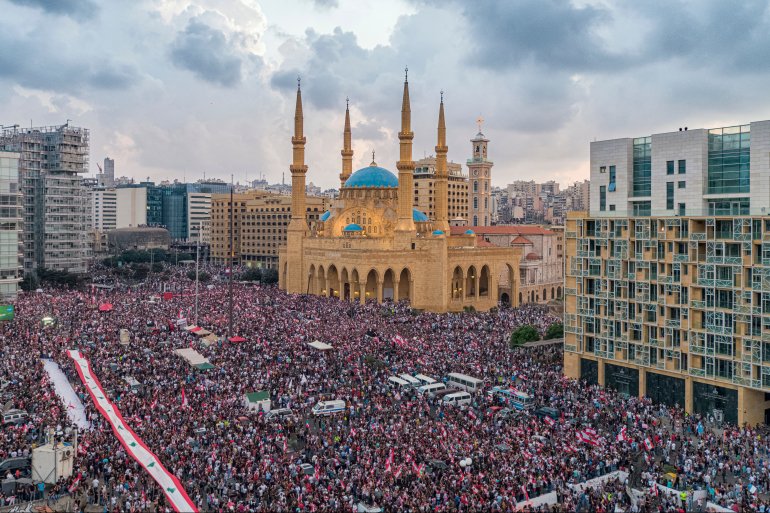Why public spaces are important in post war countries
Nadine Khayat

Last year, I embarked on a PhD investigating multiculturalism in public spaces in my hometown Beirut. One of the goals of my work was to learn from Beirut’s crowded and multicultural seafront lessons that could be applicable to the city’s less used green public spaces. And while we tend to think about public spaces as spaces for leisure and respite, in the context I was working on, Beirut- I was also looking at these spaces as spaces of insurgency, temporality, contestation and collective action.
This could not be more fitting as on October 17th, 2019 hundreds of thousands of Lebanese took to the streets in various cities calling for a change in the political system and representation under the weight of a growing economic crisis deeply rooted in corrupt public practices. Interestingly, one of the demands of the protesters was a call to reclaim public spaces specifically seafront spaces in the city of Beirut. Protesters, citizens and activists are now pushing against the traditional assigned use of public spaces creating spaces for dialogue, debate and gathering in urban sites across Beirut’s seafront public spaces. They have also shrouded parking meters along the seafront and sprayed the phrase “we are not paying” in clear defiance of the states’ neoliberal policy.
Why is safeguarding public spaces in a post war context so important?
According to the Civil Coalition for the Protection of Dalieh, Beirut has with 1 m2 of green open space per person in administrative Beirut, a lowly figure when compared to the value of 40m2/ per person recommended for healthy urban living by the World Health Organization. Beirut has only a few public gardens and the city’s largest public park, Horsh Beirut, was closed to the public for twenty- five years, opened only in 2017 after an activist campaign led by Nahnoo advocated for the importance of this green public space to community cohesion. Horsh Beirut is currently open on weekends with significant restrictions and assigned use of space. As such, the seafront functions as the primary recreational space in the city, and it is not hyperbole to claim it is the only large-scale, free, fully accessible open space in Greater Beirut.
The seafront’s divergent terrains offer much needed space for various activities. Different groups can be seen throughout the day, across seasons and months. Sport enthusiasts occupy most of the linear stretches in the mornings and evenings. Fishermen occupy stretches and rocky terrains, some livelihoods depend on the freshly caught fish that is sold on the spot. Mobile kiosks sell corn and fava beans to passers-by. Families opt to spend longer times opting for picnics in the afternoon and weekends on the sandy stretch of Ramlet el Bayda public beach and the rocky headland of Dalieh. Richer segments of society opt to have meals on the glamorous Zeituna Bay, while migrant workers stroll on the Marina across the posh restaurants to feed the fish during the weekends - their day off work.
Seafront public space has been perpetually appropriated, since the civil war years (1975-1991). Illegal businesses and cafes have sprouted along Beirut’s seafront, facilitated by a history of property appropriation in the city as well as changes in the zoning and building regulations facilitated by ministries, directorates and Beirut Municipality. Still, the seafront is an instrumental public space that allows people a much needed free gathering space, space for leisure and respite, space for health and well-being and space where community networks are safe guarded - space where planning for public spaces can happen collectively and is currently much needed!